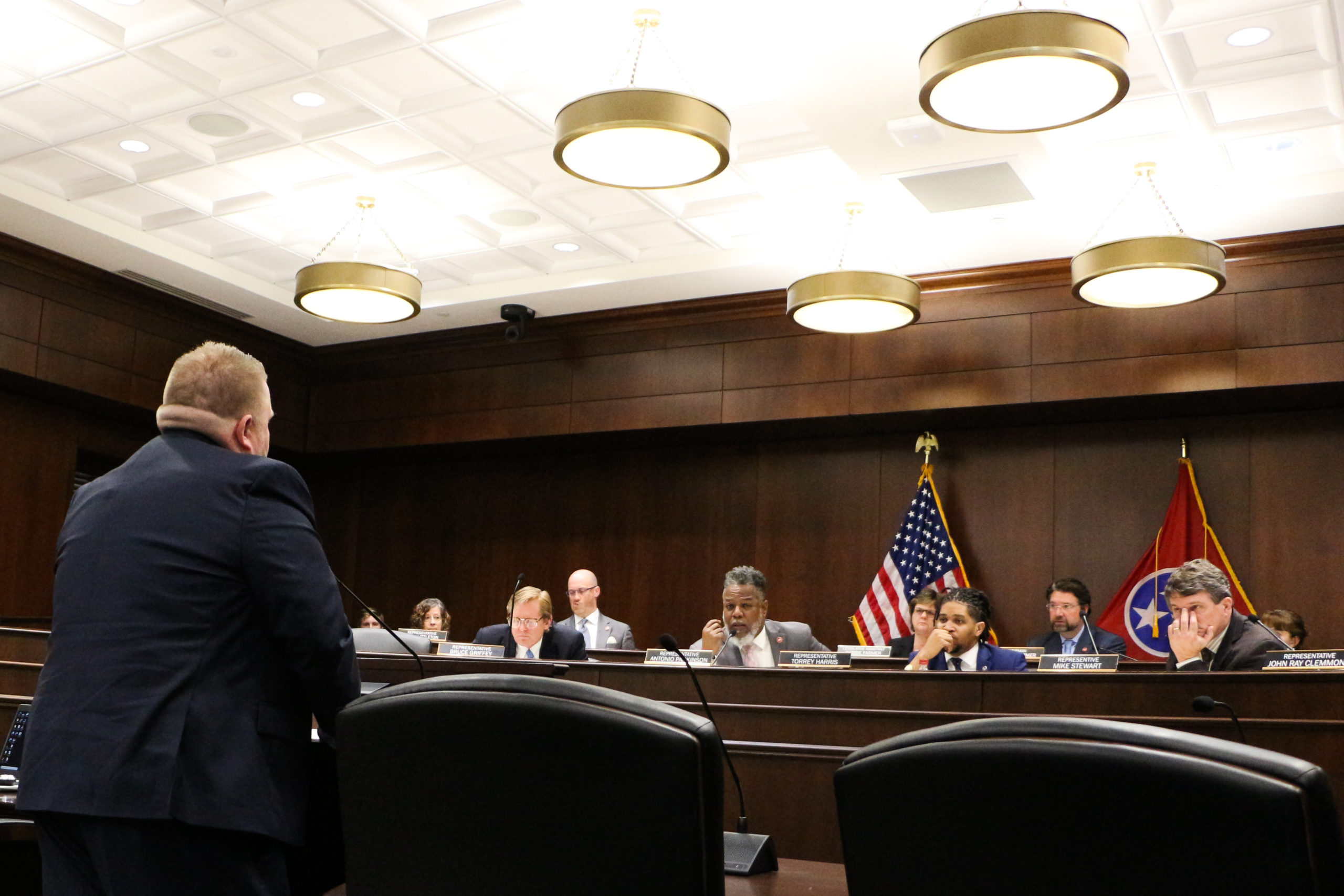
Dressed in a dark blue suit, Alex Youn stands in front of a room full of state representatives.
They’ve been chatting among themselves.
He grips the podium in front of him a little tighter and begins.
“My name is Alex Youn, and I’m born and raised here in Nashville, Tennessee,” he says, “and last April, my mother, Debbie Sisco, and my sister, Marie Varsos, were murdered by my brother-in-law.”
The room falls silent.
“I set about the process of trying to understand what, if anything, could have been done to save them. I wanted to make sure…” His voice catches. “I wanted to make sure that no one — no family — had to endure what we had to go through.”
This moment has been a year in the making for Alex.
Over that time, he’s interviewed law enforcement officials, dug through public records and researched laws and policies.
He wanted to understand how his sister Marie could do everything in her power to prevent what she saw coming — that her husband intended to kill her, her family and himself — and still end up dead.
In many ways, Marie had the odds stacked in her favor, Alex says. Unlike many victims of domestic violence, Marie had a safe place to stay, family in town to advocate for her, and the time and resources to try to navigate the patchwork of Nashville’s system.
If she couldn’t navigate the system, he wondered, who was it working for?
‘My patience is gone’
It all started the night of March 7, 2021.
It’s about 9:30 p.m. and Alex sits with Marie and their mom Debbie in a pickup truck outside of the police precinct in Hermitage.
Debbie is in the backseat comforting Marie. Bruises are starting to form around her neck from where her husband, Shaun Varsos, strangled her until she passed out. When she came to, she had a gun to her head.
“He had a gun and was threatening to kill himself,” Alex tells an emergency dispatcher on the phone. “And said that if officers were called that he would shoot himself, and that he has the names and addresses of all of her friends and would come after her, and her family and friends.”
Alex is trying to find someone to come out and meet them to take a police report. But it’s eerily quiet at the precinct — the lights are off and the door is locked.
“They’re working on getting out there to you,” the dispatcher tells Alex. “There’s just nobody in the precinct right now. So what’s going to happen is a patrol car is going to have to free up from whatever they’re doing and come to you.”
Despite his urgency, minutes go by. Then hours.
“I’ve seen six officers since we’ve been out here drive by,” he tells another dispatcher. “Sorry to keep calling, but I just don’t know what to do.”
Eventually, a dispatcher suggests they drive to a different precinct. It might be less busy. It’s about 20 minutes away. And once they get there, they still can’t get an officer to take a report.
“I’m trying to be as appreciative and waiting as long as possible,” Alex says on the phone. “But my sister was choked out to where she passed out and her husband threatened to shoot her and threatened to shoot himself. So my patience is gone.”
Then the dispatcher asks him whether Marie has filed a police report yet.
He snaps.
“That’s what we’ve been freaking trying to do!” he says.
The night was the first of many frustrating moments that Marie and her family would have with law enforcement over the next month.
Records show Marie knew the danger that might be coming. She sought help. But it wasn’t enough.
And on April 12, Shaun did exactly what he threatened to do. He killed Marie, her mom, and then himself.
“It just hasn’t seemed real, and it still doesn’t seem real,” Alex says. “It’s been hard to sort of process it.”
Just like that, Alex lost his family.
 Courtesy of Alex Youn
Courtesy of Alex Youn Family photos of Alex, his mom Deborah and sister Marie. Left, Deborah holds Alex when he was a child. Top right, Alex and Marie play together. Bottom right, Alex holds Marie as a newborn.
 Courtesy Alex Youn
Courtesy Alex Youn Alex Youn and his mom, Deborah
And the person he relied on most when he was struggling was gone.
“I had a very, very deep relationship with my mother. And, you know, would speak to her almost daily,” he says. “That person is no longer in my life. And that’s been difficult to sort of realize.”
Alex was left to settle his family’s estates.
In the process, he found something that spurred him to channel his grief into action.
What Marie left behind
Alex remembers opening Marie’s laptop. And there by the track pad was a sticky note with her password.
“It was almost like a sign,” he says, “that she wanted me to have access to her computer.”
It turns out Marie had been documenting Shaun’s abuse and her efforts to escape it. She left notes to herself. There were messages she’d sent to her therapist. Text messages with Shaun.
She’d even recorded some of their fights, and his threats. In one recording, Shaun tells Marie he’s going to make their impending divorce as “awful as possible.” In another, Marie had recorded the moment right before Shaun strangled her in early March. She shouts at him, “Stop! Don’t put your hands on me!”
Marie had left a trail. And Alex decided he was going to follow it.
“It sort of weirdly sort of turned into solving a murder mystery,” he says.
He started dissecting that month — from the time his family first went to the police in March to when they were killed in April.
“And through that process,” he says, “I discovered the irregularities, the loopholes and the failures in the system.”
First, he reached out to the agencies that touched his sister’s case: the District Attorney’s office, the dispatchers, Metro police and the sheriff’s office.
He interviewed them on Zoom from his apartment in San Francisco in hopes of understanding why it was so hard for Marie to get the help she needed.
And it didn’t take him long to stumble across one of the first problems that she and other victims of domestic violence face.
‘The failures in the system’
The police had a warrant out for Shaun’s arrest, but he walked in and out of the sheriff’s office with no trouble. The sheriff’s department says an employee checked but couldn’t find any warrants in the system for Shaun.
He wouldn’t be arrested for days, and only after Marie herself alerted police of his location — not authorities like those at the sheriff’s office.
“That has definitely been an issue that has come up many times, is the separateness of the work that the sheriff’s department does and the work of the Metro police,” said Susan Tucker-Smith, with the District Attorney’s office, in a call with Alex.
The sheriff’s department says it has added an additional step to its process to notify the police in cases like Shaun’s.
But it wasn’t the only issue. Alex discovered Shaun should have been held in jail for 12 hours once he was arrested, and Marie should have been notified of his release.
Neither happened.
That’s because the sheriff’s office failed to sign her up for a victim notification system.
Records show Marie even called the city’s non-emergency number to make sure they had her phone number right.
“I never got a notification or missed call or anything,” she tells a dispatcher. “So I just want to make sure my contact info was correct first and foremost.”
After Marie was killed, sheriff’s employees were disciplined for Shaun’s early release, and failing to sign Marie up for notifications.
But the discovery Alex is really stuck on? The court could have ordered a GPS tracker for Shaun, so Marie would know where he was.
“That’s the one thing that could have saved my mother and sister’s life,” Alex says. Or at least given them a fighting chance.
Marie and Debbie did not know it, but on the day they were killed, Shaun sat outside of their house in a rental car for 45 minutes, just waiting. He had guns, a taser and zip ties, according to police.
“I know that wasn’t the first time that he was out there,” Alex says. “And if he had a GPS monitor on him that could have alerted my sister or law enforcement, they probably would have been here still today.”
Instead, Marie walked out of the house right into a trap.
Alex later asked Assistant District Attorney Christina Johnson how often GPS trackers are used with domestic violence defendants in Davidson County.
“I … have not seen them put on domestic violence cases,” she told him. She’s been with that office, working in domestic violence, since 2018.
‘The same problems’
Looking back, Alex gets overwhelmed thinking about just how many times his sister was let down by the system. And he knows she’s not alone — Tennessee has one of the highest rates of women killed by men in the country.
“For them, they view it as one thing that went wrong in their agency,” Alex says. “But coupled together, there are like eight things that went wrong for this person who was dealing with the government to try and get the help that they needed.”
Alex pauses for a moment, thinking of his family.
“My fear is that if someone were to be assaulted right now, tonight, that I think that they might still experience some of the same problems that we experienced.”
That fear — that what happened to Marie is happening to other victims right now in Tennessee — is what led Alex to the state capitol last month.
“I realize this won’t bring my mother and sister back,” Alex tells lawmakers, his voice wavering. “But I hope that it will help save others.”
He’s fighting for four bills that he feels would have helped protect his family.
 Paige Pfleger WPLN News
Paige Pfleger WPLN NewsAlex Youn testifies to state representatives on March 16, 2022, in support of bills targeting issues he found in the current system of protecting domestic violence victims.
One would close that gap in communication between sheriff’s deputies and police officers. Lawmakers passed the bill, and now, it’s on the governor’s desk.
Another would require GPS monitoring of people charged with domestic violence offenses.
It’s clear Alex’s story is getting through to some lawmakers, but others have concerns.
“Horrible situations sometimes can make bad law,” Sen. Mike Bell tells Alex inside a senate hearing room. “As I look at this, I am hearing your pain and seeing this horrible situation. But I also want to make sure we don’t create any unintended consequences.”
Bell would later be one of four senators to vote against Alex’s GPS bill.
In the hall outside a hearing room, Alex takes a moment to catch his breath. It’s clear that telling his family’s story multiple times has taken a lot out of him. He says he’s worn out.
“I want to get some rest and then figure out, you know, what the next stages are,” he says. “A lot of people now know … what’s at stake and know the bills and know who I am and know my mother and sister’s story. And I think that that’s part of it.”
 Courtesy Alex Youn
Courtesy Alex Youn Alex Youn’s mom, Deborah Sisco, and his sister, Marie Varsos
There’s no clean victory here.
But even after a long hard day of testifying, and a year of digging for answers, Alex still has hope — hope that the system might eventually change.
Even if it’s not today.


